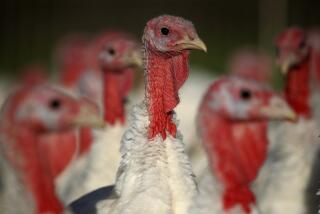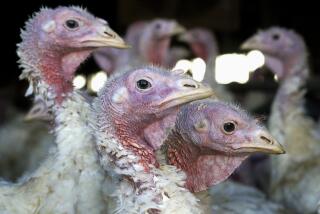Americans will waste 200 million pounds of Thanksgiving turkey
- Share via
Americans will buy 581 million pounds of turkey meat for Thanksgiving this year but will trash more than one-third of it, according to the Natural Resources Defense Council.
Some 204 million pounds of meat (of a total of 736 million pounds of fowl purchased overall) will end up in the garbage after the holiday feast, according to an NRDC blog post. The resources required to produce each pound of wasted turkey add up to a car driven 11 miles and a 130-minute shower.
Overall, that equates to greenhouse gas emissions equivalent to 800,000 car trips from New York to San Francisco, enough water to supply New York City for 100 days and $282 million.
Over the full year, Americans chuck out $165 billion in uneaten food, according to the NRDC. And turkey prices are up 7% from a year ago, pushed by the severe summer drought, according to a report on food site Allrecipes.
Consumers are now trying to find work-arounds, with two-thirds saying they’ll buy Thanksgiving ingredients on sale, according to Allrecipes. Nearly half plan to use a coupon or shop around at multiple outlets.
Some consumers, though, are looking for premium options, which means that sales of heritage turkeys may continue to rise.
The birds are more similar to the wild turkeys eaten during the original Thanksgiving festivities than today’s domestic, farm-raised varieties, according to the National Wild Turkey Federation.
Wild turkeys can run up to 25 miles per hour, compared to the 23.35 miles per hour averaged by Usain Bolt, widely considered to be the fastest human alive. The fowl rarely exceed 24 pounds, while bred turkeys often surpass 40 pounds. Their gobbles can be heard up to a mile away.
ALSO:
Thanksgiving goes gourmet with high-end turkeys
Thanksgiving dinner will cost more as turkey prices rise
Drought leads restaurants to raise prices, cut portions
More to Read
Inside the business of entertainment
The Wide Shot brings you news, analysis and insights on everything from streaming wars to production — and what it all means for the future.
You may occasionally receive promotional content from the Los Angeles Times.











